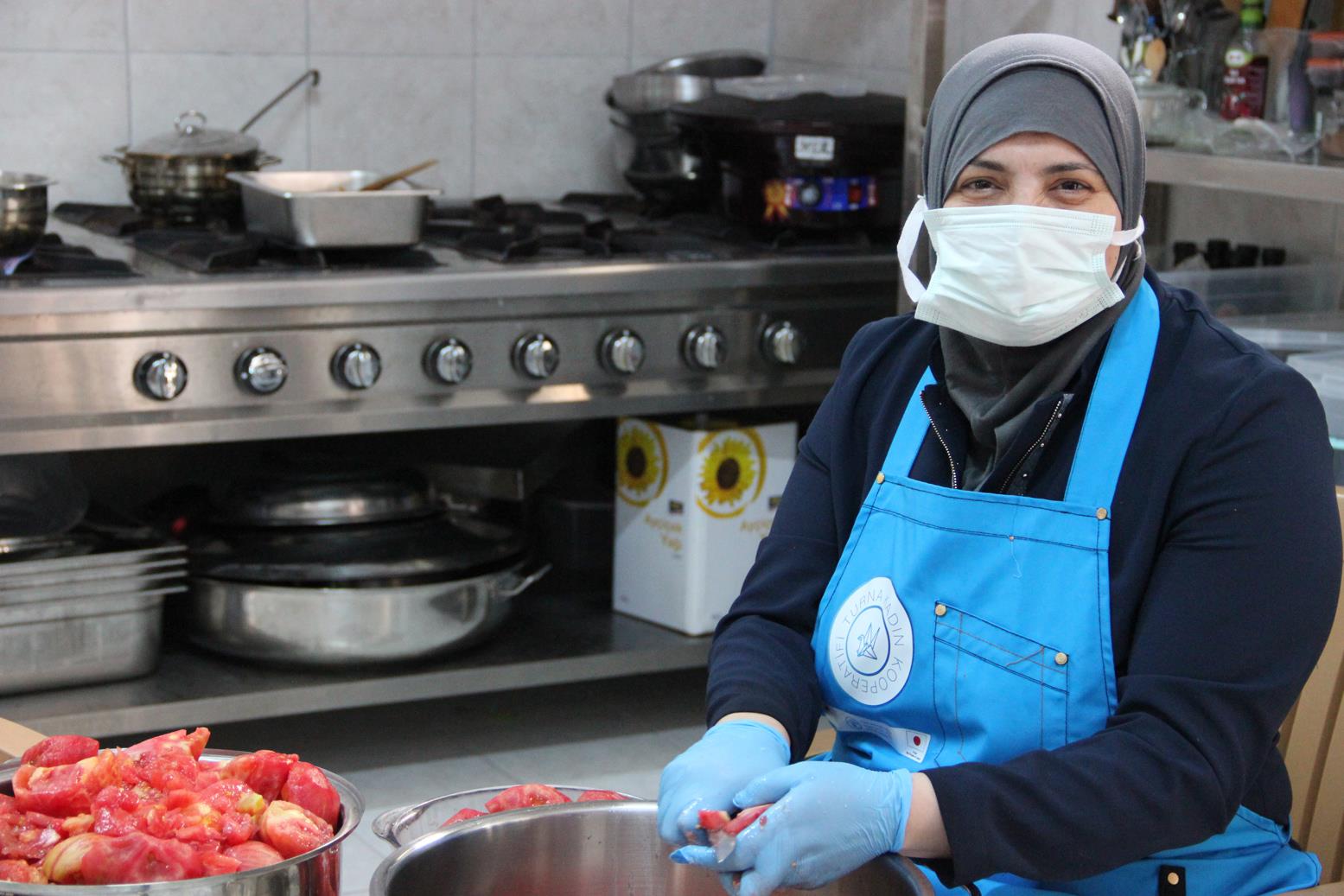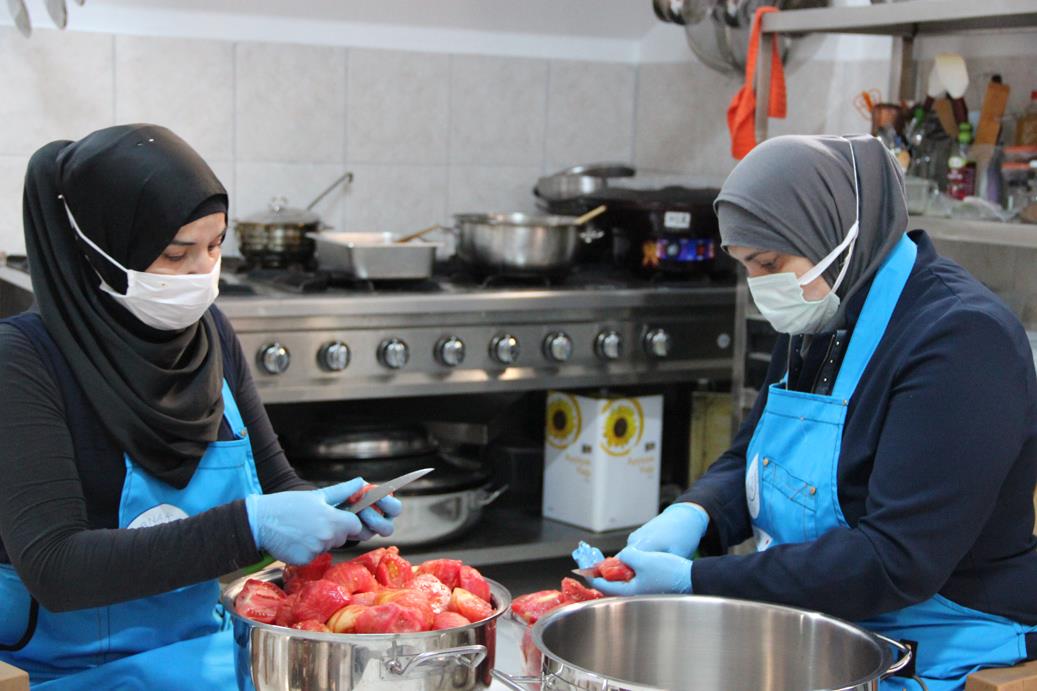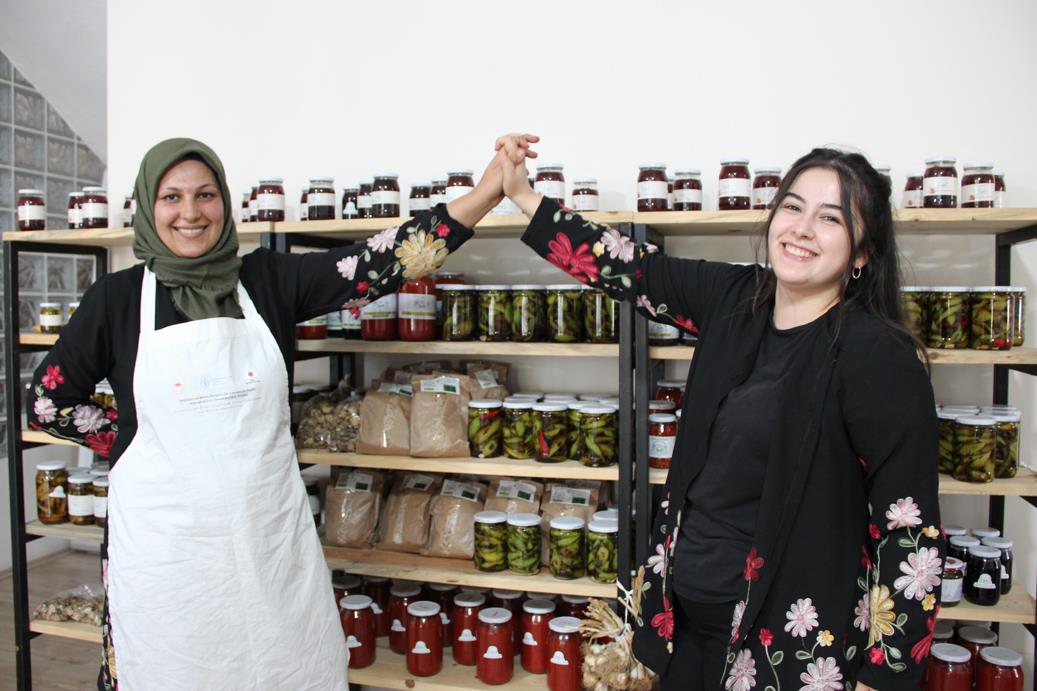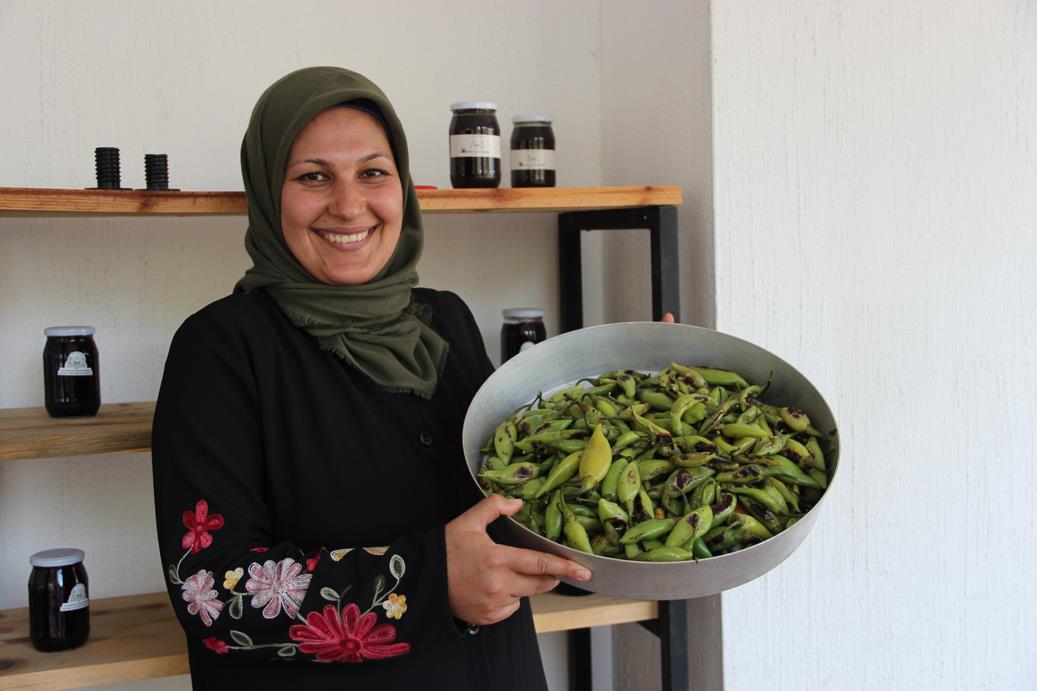
Forging bonds: Syrian refugees find more than new livelihoods in Turkey
Food cooperatives offer income, dignity and friendships for Syrians fleeing conflict
Syrians, like Tuka (above), who have fled the conflict and arrived in Turkish host communities, are getting training and support from FAO and the Turkish Government to work in agrifood businesses, gaining new livelihoods and forging new friendships. ©FAO
17/12/2021
When Tuka arrived in the Turkish port of Izmir, seeking temporary protection after fleeing the conflict in Syria in 2017, it felt as though she had found a safe haven, but lost almost everything else. The violence had claimed several of her loved ones. The tailoring workshop she had painstakingly built up in her home city of Aleppo was no longer.
She tried to carry on with the tailoring business in Turkey, working from home, but found she could only earn a paltry USD 1.50 a day. She and her husband had to borrow money to stay afloat, without any clear idea of when they’d be able to return it. They both struggled to master the Turkish language skills they needed to survive.
“It took us some time to understand that market needs are different in Turkey...and realize that we must be open to learning new skills.”
That’s when Tuka’s resilience and determination kicked in. She seized the opportunity to enrol in a food production and entrepreneurship skills training provided by FAO and the Turkish Ministry of Agriculture and Forestry and funded by Japan. And she’s never looked back since.
Tuka learned how to stuff mussels, prepare sauces and store, pack and label foods, using equipment and packaging tools which were totally new to her.
Originally a tailor, Tuka not surprisingly says she initially “had no [professional] food production skills...I also realized that I was not properly storing and preserving food…through the training, I learned how, even without a freezer.”
Now she says, not only has acquired new know-how in making a living, she has also made new friends. As an added bonus, she is also enjoying cooking more.


After joining a cooperative, Tuka is earning five times as much as before and is becoming a role model for many women of both nationalities. ©FAO
Tuka also took part in training sessions on entrepreneurship and the cooperative model to educate herself in agrifood business development as well as Turkish language and culture classes.
Now she’s a dedicated member of the Turna Women’s Cooperative, an agrifood venture in Izmir supported by FAO.
She’s earning five times as much income for her family as before and she’s also made an array of new friends, both Syrian and Turkish. Many have said that they see Tuka as a role model.
“We especially appreciate and respect Tuka for her dedication,” says Turna Women’s Cooperative acting president, Asli Kaya. “Her story has inspired me to never give up and has helped us remain hopeful during these difficult times of COVID-19.”
Tuka is just one of dozens of micro-scale entrepreneurs who benefited from the trainings, offered both to Syrians and members of the Turkish host communities in Izmir, Bursa and Şanlıurfa.
“We believe that this project has two great achievements: it has developed skills and self-confidence of both Syrian and Turkish women to generate income. And two, it has enhanced social interaction and the cohesion between the two groups,” said Kazuhiro Suzuki, Japan’s ambassador to Turkey.
“The project has allowed Syrian and Turkish peers to meet, exchange different practices and collaborate as equal partners,” added Viorel Gutu, FAO Subregional Coordinator for Central Asia.
As Kaya puts it: “Listening to our Syrian peers and learning what they went through taught us that we can find hope and overcome whatever challenges await us. They taught us to be resilient, strong and, most importantly, optimistic about whatever the future holds.”
Thanks to the support of implementing partners and social media influencers, the businesses have been able to keep going throughout the pandemic. In fact, “interest in local women’s cooperatives has increased substantially during the COVID-19 pandemic, as people are actively pursuing healthier diets and better nutrition in order to maintain a strong immune system,” says Dilara Kocak, a nutritionist and advocate on food issues.
The cooperatives have integrated new digital marketing techniques to grow their market share using well-known e-commerce web and mobile applications.
According to Irem Gulsen, president of the Orhaneli Women Cooperative in Bursa, the training has paid dividends: “Thanks to the marketing course, we learned how to operate within the market, how to approach people and institutions, how to explain our women-led initiative and gain more clients.”
They’ve also managed to attract a loyal base of customers like Elcin Elgin, who says: “I am thrilled to find Geographically Indicated Products made by women from all over Turkey packed and sold here in Izmir.”

Dozens of micro-scale entrepreneurs have benefited from the trainings, offered both to Syrians and members of the Turkish host communities. ©FAO
Childcare support
The cooperatives have also done a lot to address their members’ socio-economic needs. As many of them have children, the establishment of childcare facilities has opened up new possibilities for many who would otherwise be unable to take part while ensuring the safety of their children.
Manal el Ahmad, a Syrian cooperative member from Bursa, explains: “Both my children and I were happy to use the childcare services at the cooperative. They even helped my children to learn Turkish.”
A model that works
So far, 80 people, including 15 men, have benefited from the project since 2018. More than 75 percent secured stable jobs or created incomes for themselves and others in 2021.
The establishment and development of the cooperative model has been a clear success. Based on this experience, FAO is planning to expand its cooperative and entrepreneurship initiative to more Turkish provinces.
Related links
Learn more
- Publication: Driving resilience in agriculture
- Website: FAO in emergencies
- Website: FAO and migration
- Website: FAO and Japan partnering to build global food security

